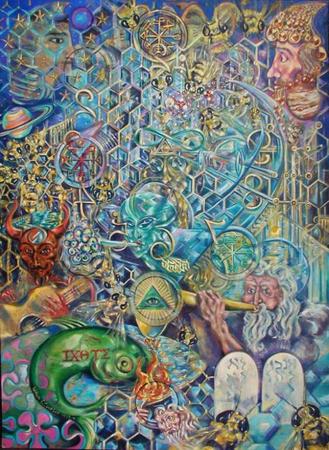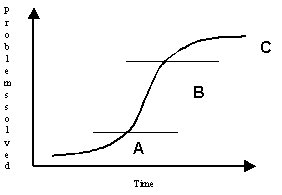 by Flemming Funch by Flemming Funch
Yahoo Dictionary:Paradigm: A set of assumptions, concepts, values, and practices that constitutes a way of viewing reality for the community that shares them, especially in an intellectual discipline. An important word to know. The Paradigm Web:The word "paradigm" was originally one of those obscure academic terms that has undergone many changes of meaning over the centuries. The classical Greeks used it to refer to an original archetype or ideal. Later it came to refer to a grammatical term. In the early 1960s Thomas Kuhn (1922-1996) wrote a ground breaking book, The Structure of Scientific Revolutions, in which he showed that science does not progress in an orderly fashion from lesser to greater truth, but rather remains fixated on a particular dogma or explanation - a paradigm - which is only overthrown with great difficulty and a new paradigm established. Thus the Copernican system (the sun at the center of the universe) overthrew the Ptolemaic (the earth at the center) one, and Newtonian physics was replaced by Relativity and Quantum Physics. Science thus consists of periods of conservatism ("Normal" Science) punctuated by periods of "Revolutionary" Science. Even more important is finding out how to get these things changed, preferably faster than waiting around for the people with the old views to die. From the same source:Paradigm Shift: When anomalies or inconsistencies arise within a given paradigm and present problems that we are unable to solve within a given paradigm, our view of reality must change, as must the way we perceive, think, and value the world. We must take on new assumptions and expectations that will transform our theories, traditions, rules, and standards of practice. We must create a new paradigm in which we are able to solve the insolvable problems of the old paradigm. More good info at Wikipedia. Anyway, so, get that. A paradigm is on its way out when it no longer solves the problems it is meant to solve. Or, rather, it should be on its way out, and a better paradigm should replace it, which better solves the present problems. For various reasons, that might not happen readily. There are people with a vested interest in the old paradigm, who have based their careers on it. And we all have habits that might be difficult to change, including habits of thinking. And we might not really know what the new, better paradigm should be. Even if we bump into it.
 Paradigms usually don't start working well right away. And they don't suddenly just stop working either. One way of looking at the life cycle of a paradigm is with a diagram like this. There's a starting period, A, when the paradigm is still being developed, and one hasn't quite figured out the best way of using it yet, so it isn't all that impressive how well it solves problems. Then there's a phase B, where it all has been streamlined, and the paradigm accepted, and it solves lots of problems. Finally, phase C, it slows down, or might eventually drop. Maybe the problems get harder, or they change fundamentally. That's probably when somebody might start looking for better paradigms. Would be better if they did it in phase B, so that there would be time to develop the new approach. But most people wouldn't be looking at that time. Paradigms usually don't start working well right away. And they don't suddenly just stop working either. One way of looking at the life cycle of a paradigm is with a diagram like this. There's a starting period, A, when the paradigm is still being developed, and one hasn't quite figured out the best way of using it yet, so it isn't all that impressive how well it solves problems. Then there's a phase B, where it all has been streamlined, and the paradigm accepted, and it solves lots of problems. Finally, phase C, it slows down, or might eventually drop. Maybe the problems get harder, or they change fundamentally. That's probably when somebody might start looking for better paradigms. Would be better if they did it in phase B, so that there would be time to develop the new approach. But most people wouldn't be looking at that time.
Joel Barker explained all of that really well, in a (very expensive) video and a (cheap) book. Several books, actually.
It is worthwhile to learn to see paradigms. So one can realize which ones one is stuck in, and so one can recognize the alternatives when one sees them. Both are hard. The well-worn paths of the human mind makes it difficult to see where else one could go.
Imagine that changed. That we evolved a bit and we always had a consciousness of what paradigms we were living in, and the myriad of other possibilities. Meta-humans.
|
|
No comments:
Post a Comment